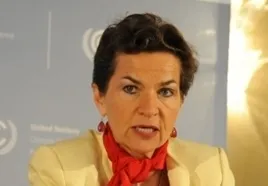U.N. Climate Chief Christiana Figueres '79 Evaluates Issues on Climate Change

1. How much did religious leaders advocate against global warming at the United Nations climate talks this past winter in Durban, South Africa?
I have been very impressed over the past few years at how the faith community is getting more and more involved in climate issues; they are concerned about what humanity is doing to creation. In Durban we had, of course, Archbishop Tutu, who was there as the local leader of the faith community, but we also had probably the largest participation of the faith community we've ever had, from religions from around the world, trying to support the process.
2. So the U.S. is unusual in that the reality of climate change is sometimes contested on religious grounds here?
Yes, that is a unique situation.
3. How are military entities engaging with climate change?
It's very interesting how the military has become acutely aware of the fact that climate represents, probably, the most difficult security issue that they are going to face over the next 20 years, just because of migration. We see areas that are going to be underwater, that are going to be in drought - there is going to be a massive migration such as we have never seen, which represents a severe security problem for what are currently stable states.
The U.S. military has already done quite a few studies about the implications of climate change on the security and the borders of the United States. And they, I think, are taking on much more of a progressive role; they're wanting to contribute to addressing climate change. They are already looking at investing in new technologies that are much more efficient in the use of energy. They're actually taking good leadership.
4. What can people in the U.S. do to combat climate change?
The United States is the industrialized country that has the worst waste of energy in the entire world. The easiest thing is to work on energy efficiency in buildings, in transportation, in lighting - that could already be a huge contribution. And it's painless! What is the problem? This room, here, was all lit before we walked in. The room should light up when we walk in and then light down when we walk out. And look at the temperature in this room; energy is being wasted here, but there's just no awareness of it. So just on energy efficiency, a huge amount could be done.
Transportation, fuel, our vehicle standards - that is something that [Obama's] administration is working on. But the fact that the fuel standards in this country are still under fuel standards in China doesn't speak very highly.
And third, demand leadership - demand leadership! The United States, if it continues the way it is going, is going to miss out on the opportunity to be the leader in new technologies. The United States will be in the situation, 20 years from now, of importing cutting-edge technology from China, because the U.S. is not investing in that technology.
Christiana Figueres '79 is the Executive Secretary of the U.N. Framework Convention on Climate Change. She is also the founder of the non-profit Center for Sustainable Development of the Americas and received the Hero for the Planet award from National Geographic in 2001. In addition to her B.A. in anthropology from Swarthmore, Figueres holds a master's degree in social anthropology from the London School of Economics and a certificate in Organizational Development from Georgetown University. Figueres will speak at Swarthmore on Sept. 28 in Science Center 101 at 1 p.m. on the anthropology of climate change.



